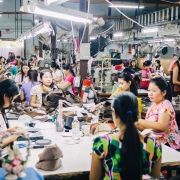Despite its shortcomings, America is still by far the greatest country in the world. For those of us who are fortunate enough to live here and are, thus, able to enjoy the luxuries provided to us by our American way of life, we often make the mistake of assuming our way of life is the only way of life.
It wasn’t so long ago when music sensation, and a prominent figure of female empowerment, Beyoncé Knowles, came under fire when it was discovered that her athletic clothing line is being produced by women in alleged “sweatshops” in Sri Lanka.
The media, of course, used this news to criticize Beyoncé for the circumstances surrounding the production of her clothing line. Aside from the typical arguments associated with supposed “sweatshops,” since Beyoncé is such a vocal advocate of feminist issues, the fact that the factory responsible for making her products is filled with mostly women seamstresses has given critics more ammunition to cast in her direction.
Vilifying the factory where Ivy Park clothing is made, The Sun initially ran the story, which referred to these factory workers as “sweatshop slaves.” Capitalizing on a story that was sure to grab the attention of its readers, Vice Media published its own version with the title, “How Much it Sucks to be A Sri Lankan Worker Making Beyoncé’s New Clothing Line.”
True, the workers in the Sri Lankan factories are only making the equivalent of around $6.23 a day which, to any American, immediately sounds absurd. Surely, no one can live off such a low wage! Though we are beyond fortunate to live in a country where this sentiment is the norm, we need to consider the economic realities in Sri Lanka.
In The Sun’s piece, a 22-year-old factory worker is interviewed. She tells reporters that she is not making enough to get by. However, her monthly salary, which is the equivalent to $380, according to the Daily Beast, actually surpasses the country’s mandatory minimum wage by $178 each month. All things considered, this means Beyoncé’s factory is actually doing quite a bit to help its Sri Lankan employees, who would most likely be making less money if employed elsewhere.
Additionally, the factory responsible for producing Beyoncé’s clothing line is known for its above average working conditions and safety record. Though an American taking a trip to Sri Lanka might not find this factory satisfactory according to their own scale, again, this is because we are so lucky to live in America where free markets and technological advances have allowed us the luxuries of “first world” life.
For these Sri Lankan seamstresses, this factory allows them to provide for themselves and their families and gives them an access point into the labor force, something they might not otherwise have had access to.
Additionally, cheap labor in East Asia allows developing countries to do business with first world nations and participate in the global marketplace, something that has to occur if they want to prosper.
Most of the Sri Lankan population lives in rural areas. Aside from the garment industry, Sri Lanka is mostly an agrarian society. For those growing up on a farm, there is not much hope of escaping that life, unless you are fortunate enough to get a job in a factory, like the one producing Beyoncé’s clothing. For these women, a factory job is far better than the alternative options, or lack thereof.
“We have to ask ourselves: what would these women be doing if they didn’t work in a garment factory? Would their lives be better? Absolutely not,” said Mushfiq Mobarak, Professor of Economics at Yale University and co-author of a 2015 study in the Journal of Development Economics, Manufacturing Growth and the Lives of Bangladeshi Women. Having studied the garment industry in the South Asian Region extensively, Mobarak is an insightful resource into these garment factories and the opportunities they provide to workers.
The garment factories give these women the opportunity to earn more money than they otherwise would have had. Additionally, many of these factories require basic literacy and math skills, which many rural Sri Lankans simply do not have. As a result, many of these women are going to school, sometimes for the first time in their entire life, all to learn the skills necessary to securing employment in the garment industry.
For those women coming from more urban areas, a significant portion resorts to more degrading means of providing for themselves. As prostitution and other sex work are common for both girls and women in this region, these factories can potentially put them on a much more productive and dignified path. This aspect of the garment industry is clearly aligned with Beyoncé’s message of female empowerment.
According to the Daily Beast’s interview with Mobarak:
“When factory jobs become available in these countries, we see returns in skills that people develop. If a young woman gets an education in the 5th grade, then her labor opportunities change.”
To be sure, in spite of the positive elements associated with factory work in developing countries, there are still many concerning issues that need to be addressed. Factories of this nature have had a history of inhumane treatment of their employees, sometimes even denying workers the right to use the bathroom.
To ignore the existence of inhumane factories would be ignorant, and to praise the actions of these institutions would be wrong, but there are ways to encourage change that would not result in a loss of factory jobs, and thus, a loss of opportunity for these Sri Lankan women.
As Mobarak said, “We need to figure out how to incentivize buyers and retailers from the U.S. and the U.K. to invest in factory safety. Retailers need to collaborate and jointly invest,” he said, “so that not everyone who is investing is at a competitive disadvantage of having to sell more expensive clothes.”
Above all, businesses utilizing inexpensive labor in developing countries are looking to maximize their profit. This means there is an incentive to do business with these factories in order to reduce overhead costs and offer products to consumers at a competitive rate. In order to do this, businesses must appease its consumers.
In a time when PR is everything, many companies understand the importance of consumer feedback. Sites like Yelp have given consumers a mouthpiece to both compliment and complain, keeping business owners accountable for their actions. Associating themselves with inhumane factories will only serve to anger first world consumers, anxious to take up a cause, which could then result in decreased revenue.
Before demonizing these garment factories, and throwing around the term, “sweatshop,” it is important to consider how they contribute to the lives of their workers. We need to judge these work environments by standards which may be foreign to our own. After all, most places are not as prosperous as America.













